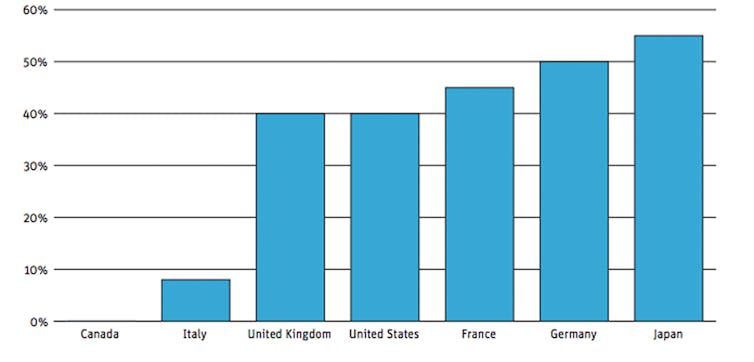One of the added advantages of being born into a wealthy family in Canada is that neither you nor your progeny have to pay an inheritance tax. That’s because Canada is the only G7 country that doesn’t tax estates or wealth handed down from one generation to another (aside from small probate fees in some provinces). But a new report says that should change.
The Canadian Centre for Policy Alternatives, in its report called “Born to Win,” says a Canadian inheritance tax “could go a long way to curbing the tendency of Canada’s tax system to heighten socially, politically and economically harmful levels of wealth concentration in Canada.”
It noted the average net worth of Canada’s 87 wealthiest families rose by 37 per cent between 2012 and 2016 — from $2.2 billion to $3.0 billion — while the net worth of middle class families increased by only 16 per cent (from $264,000 to $305,000) over the same period.
Skewing the playing field
The report’s recommendations are inherently linked to the maintenance of inequality from one generation over the other — a skewing of the playing field of life from the start.
Should our laws focus on promoting equality of opportunity and social justice or the individual freedom to bequeath and right to dispose of one’s property?
Debates on this issue are not new. Ideas about restricting or abolishing inheritance have been floated by Western social thinkers for nearly 300 years and probably more.

Charles de Montesquieu, the 18th century French philosopher who inherited a large estate and fortune from one of his uncles, remarked that “natural law commands to fathers to feed their children, but does not oblige them to make them their heirs.”
Clearly, the author of the Spirit of the Law (1748) squarely sided with the view that inheritance laws are appropriate for society to maintain an equilibrium.
Reducing inequity
Another French philosopher, Jean-Jacques Rousseau, went further in his egalitarian view. While inequality is unavoidable, he argued, placing limits on the inheritance of wealth is necessary for society. Rousseau believed legislators not only can, but also must, regulate the intergenerational transfer of wealth through laws in a manner that reduces social inequality in society.
During the tumultuous French Revolutionary period of 1789-1799, the Count of Mirabeauwent even further, saying passing on wealth from one generation to another promotes “inequality in the ownership of domestic goods.” According to Mirabeau, property was to be limited to a lifetime and then reverted to the state upon a person’s death.
In the late 19th century, Emile Durkheim, considered one of the fathers of sociology, proposed the discontinuance of inheritance, which he considered an archaic and even immoral practice.
Durkheim believed the surplus from one generation to another should not revert to the state, but instead should be used to form social institutions (akin to today’s professional guilds) that would manage and redistribute the wealth.
When ‘tax’ is a dirty word
In the current socio-political atmosphere where “tax” is a dirty word that politicians avoid pronouncing as much as possible, it is unlikely we will see any significant legislative reforms to include an inheritance tax in Canada.
In the meantime, those of us who care about this problem still have a solution.
It is possible for each of us to privately dispose of our wealth by including charities as beneficiaries in our will — in the hope that such institutions will be able to contribute to correcting social inequalities in the future instead of reproducing them.
https://theconversation.com/should-canada-have-an-inheritance-tax-102324
 Recent Comments
Recent Comments
This is a indeed a very interesting post about an problem as old as inequality itself.
Canada once did have an Estate Tax. The Estate Tax was replaced by the current system which mandates that when a person dies there is a deemed disposition of all of his property. A capital gains tax is then imposed on his final tax return for his year of death.
This means that ALL Canadian “tax residents” will (to some extent) pay a tax on their death.
Let’s compare this system to the United States which does have Estate taxes. In the United States it is (at present) only those with more than eleven million dollars in assets who will pay the estate tax. Those with estates less than 11 million can simply leave assets to their heirs. The heirs acquire the assets at the fair market value at the time of death. This means that the increase in value during the lifetime of the decedent actually escapes taxation all together.
I would argue that Canada’s deemed disposition on death rules actually imposes a greater tax incidence on death than the United States Estate taxes.
My main point is this: Canada does have estate taxes. It just doesn’t call it an estate tax.